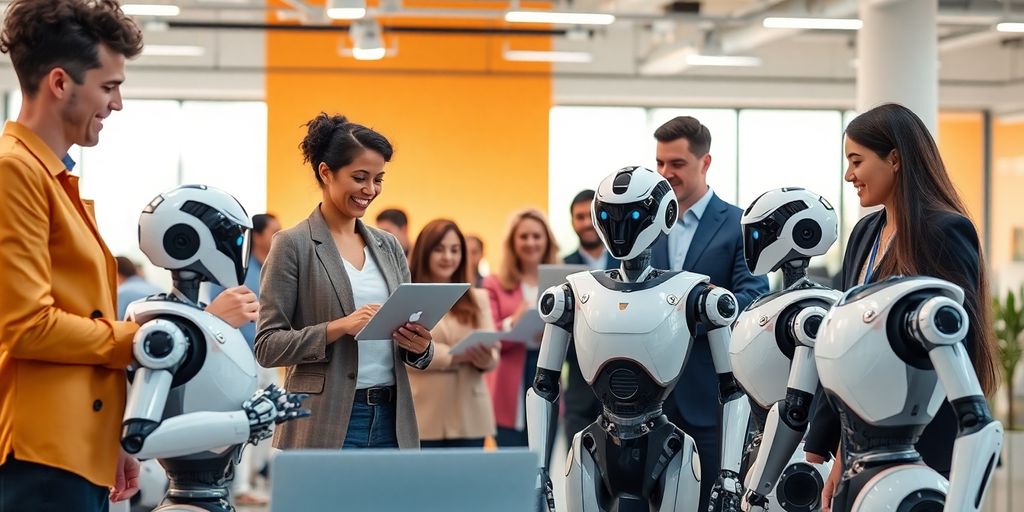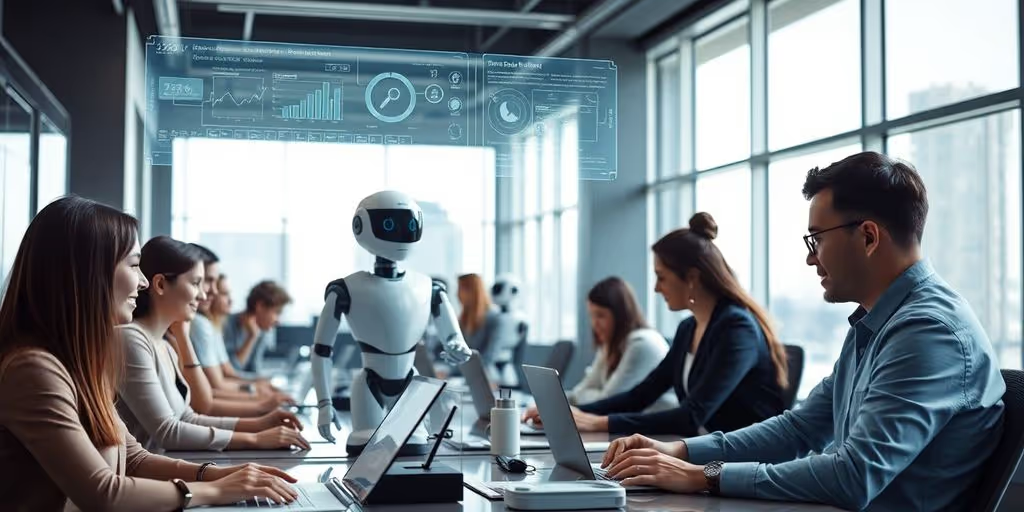Why Smart Companies Are Racing to Upskill as AI Agents Transform the Workforce
Discover how smart companies are upskilling for the future workforce as AI agents transform industries.
AI agents are changing how we work, and it's happening fast. Companies are realizing they need to get their teams ready for this big shift. It's not just about using new tech; it's about making sure people have the right skills to work with AI agents. This article talks about why smart companies are quickly training their staff to keep up with these changes.
Key Takeaways
AI agents are becoming a big part of how businesses operate, so companies need to know what they can do.
The job market is changing because of AI agents, meaning some old jobs will look different and new ones will show up.
Companies should put money into ongoing learning to help their workers learn new skills for AI agents.
It's important to use AI agents in a good way, which means thinking about fair rules and testing them out.
Working together, governments and businesses can make sure AI agents are used for good things and help the economy.
The Rise of Autonomous AI Agents
The world of artificial intelligence is changing fast. We're not just talking about simple chatbots anymore. The focus is shifting towards AI that can act on its own, making decisions and taking actions without needing constant human input. This move towards AI automation is what we call Agentic AI, and it's a big deal for businesses.
Understanding AI Agents' Capabilities
AI agents are more than just souped-up chatbots. Think of them as digital workers that can handle complex tasks. They can analyze data, make plans, and even learn from their mistakes. For example, an AI agent could manage a company's social media presence, responding to customer inquiries, scheduling posts, and even creating content. Or, imagine an agent that optimizes a supply chain in real-time, adjusting routes and inventory based on current conditions. The possibilities are pretty broad.
The Shift Towards Autonomous Systems
What's driving this shift? A few things. First, there's the increasing power of computing. We can now process huge amounts of data much faster than before. Second, there are better algorithms. Generative AI models like Claude AI are getting really good at understanding and responding to complex prompts. And third, businesses are realizing that AI can help them save money and improve efficiency. They are starting to see the potential of AI to handle repetitive tasks, freeing up human employees to focus on more creative and strategic work.
Real-World Applications of AI Agents
AI agents are already being used in a bunch of different industries. Here are a few examples:
Customer Service: AI agents can handle basic customer inquiries, freeing up human agents to deal with more complex issues.
Marketing: AI agents can create personalized marketing campaigns, targeting specific customers with tailored messages.
Finance: AI agents can detect fraud, manage investments, and provide financial advice.
Healthcare: AI agents can diagnose diseases, develop treatment plans, and even assist with surgery.
The rise of autonomous AI agents isn't just a technological trend; it's a fundamental shift in how businesses operate. Companies that embrace this change and invest in upskilling their workforce will be well-positioned to thrive in the age of AI.
Navigating the Evolving Workforce Landscape
It's no secret that AI agents are changing things up, and the workforce is definitely feeling it. We're seeing shifts in what skills are needed, how jobs are done, and even the overall economic picture. It's a lot to take in, but understanding these changes is key for businesses that want to stay ahead.
Identifying New Skill Demands
AI agents are taking over routine tasks, which means the skills humans need are changing. It's less about doing repetitive work and more about things AI can't easily do – like critical thinking, creativity, and complex problem-solving. We need people who can work with AI, not just alongside it. Think of it as needing more conductors for the AI orchestra, rather than just more musicians playing the same old tune. The Anthropic Education Report shows how university students use Claude, and it's clear that STEM students are early adopters of AI tools.
Reshaping Traditional Job Roles
Many traditional job roles are being reshaped by AI. Some tasks are automated, others are augmented, and some roles might even disappear altogether. For example, the role of engineers is changing, becoming more about orchestrating AI. It's not all doom and gloom, though. New roles are emerging too, like AI trainers, data scientists, and AI ethicists. The key is to be flexible and adapt to these changes. It's about understanding how AI can assist in various roles, and then focusing on the human skills that complement those AI capabilities. We're starting to give AI agents real autonomy, and we need to be ready for the consequences.
Preparing for Economic Impacts of AI Agents
The rise of AI agents will have a big impact on the economy. There's the potential for increased productivity and economic growth, but also the risk of job displacement and increased inequality. It's important to think about how to mitigate these negative impacts and ensure that the benefits of AI are shared more widely. This might involve things like developing targeted AI policy, investing in education and training, and modernizing our social safety net. We need to prepare for potential large-scale changes to the economy, ensuring AI benefits are broadly shared.
Strategic Upskilling for Business Resilience
It's no secret that AI is changing everything, and fast. For businesses, this means it's time to get serious about upskilling. Companies that proactively invest in their workforce will be the ones that not only survive but thrive in this new era. It's about more than just training; it's about building a culture that embraces continuous learning and adaptability. The skills required for work are projected to undergo a 70% transformation by 2030, a significant shift largely driven by the accelerating influence of AI.
Investing in Continuous Learning
Continuous learning isn't just a buzzword; it's a necessity. Companies need to create programs that allow employees to constantly update their skills. This could include offering online courses, workshops, or even mentorship programs. The key is to make learning accessible and relevant to the changing needs of the business. Think about setting up internal knowledge-sharing platforms, or even sponsoring employees to attend industry conferences. It's about creating a learning ecosystem, not just a one-off training session.
Building an AI-Ready Workforce
An AI-ready workforce isn't just about knowing how to code. It's about understanding how AI can be used to solve problems and improve processes. This means training employees in areas like data analysis, machine learning, and AI ethics. But it also means teaching them how to work alongside AI systems. It's about fostering collaboration between humans and machines, not just replacing humans with machines. Consider these points:
Identify skill gaps within your organization.
Develop targeted training programs to address those gaps.
Provide opportunities for employees to practice using AI tools.
Fostering a Culture of Adaptability
Adaptability is the name of the game. The pace of change is only going to accelerate, so companies need to create a culture that embraces change. This means encouraging employees to experiment, take risks, and learn from their mistakes. It also means being willing to let go of old ways of doing things and embrace new ones.
A culture of adaptability starts at the top. Leaders need to model the behavior they want to see in their employees. This means being open to new ideas, willing to experiment, and always learning. It also means creating a safe space for employees to take risks and make mistakes. When employees feel supported, they're more likely to embrace change and adapt to new challenges.
Ensuring Responsible AI Agent Deployment

Prioritizing Ethical AI Development
It's easy to get caught up in the excitement of new tech, but we can't forget about ethics. Ethical AI development means building AI agents that align with human values and societal norms. This isn't just about avoiding bad press; it's about creating tools that genuinely benefit everyone. We need to think about things like bias in data, transparency in algorithms, and accountability for decisions made by AI. It's a complex area, but one we can't afford to ignore. For example, consider the importance of AI compliance to ensure ethical standards are met.
Implementing Robust Testing and Evaluation
Before unleashing AI agents into the world, rigorous testing is a must. Think of it like this: you wouldn't release a new car without crash tests, right? Same goes for AI. We need to put these agents through their paces, simulating real-world scenarios to see how they perform. This includes:
Testing for accuracy and reliability.
Evaluating for unintended consequences.
Monitoring for bias and fairness.
Testing and evaluation aren't one-time events. They need to be ongoing processes, adapting as the AI agents learn and evolve. It's about building a system of continuous improvement, ensuring that these tools remain safe and effective over time.
Addressing Potential Societal Harms
AI agents have the potential to do a lot of good, but they also pose risks. Job displacement, privacy violations, and the spread of misinformation are just a few of the concerns. We need to be proactive in addressing these potential societal harms. This means:
Developing strategies to mitigate job losses through upskilling programs.
Implementing strong data privacy protections.
Combating the spread of AI-generated fake news.
It's not about stopping progress; it's about guiding it in a way that benefits society as a whole. We need to have open and honest conversations about the potential downsides of AI and work together to find solutions. The goal is to harness the power of AI while minimizing the risks. Here's a quick look at potential risks:
Government and Industry Collaboration for AI Agents
Developing Targeted AI Policy
Crafting effective AI policy requires a delicate balance. It's about encouraging innovation while also protecting against potential risks. Governments need to work closely with industry leaders to understand the capabilities and limitations of AI agents. This collaboration can lead to the creation of informed regulations that are both practical and forward-thinking. For example, policies could focus on data privacy, algorithmic transparency, and accountability. The goal is to create a framework that fosters responsible Business AI development and deployment.
Strengthening National Security Measures
AI agents present both opportunities and challenges for national security. On one hand, they can enhance defense capabilities, improve intelligence gathering, and strengthen cybersecurity. On the other hand, they could be exploited by malicious actors for cyberattacks, disinformation campaigns, or autonomous weapons systems. Government and industry must collaborate to develop robust security measures to protect against these threats. This includes investing in research and development of AI security technologies, establishing clear guidelines for the use of AI in defense, and promoting international cooperation on AI security issues. It's a complex landscape, but proactive measures are essential.
Accelerating Government AI Adoption
Governments can significantly improve public services and operational efficiency by adopting AI agents. This includes applications in healthcare, education, transportation, and public safety. However, successful AI adoption requires careful planning, investment in infrastructure, and workforce training. Government and industry can partner to develop AI solutions tailored to specific government needs, share best practices, and provide training programs for government employees. Chat GPT 4 can be used to streamline processes. This collaboration can accelerate the pace of AI adoption and ensure that government agencies are able to realize the full potential of AI agents.
It's important for governments to lead by example in the responsible and ethical use of AI. This includes establishing clear guidelines for AI procurement, promoting transparency in AI decision-making, and ensuring that AI systems are fair and unbiased. By setting a high standard, governments can encourage the private sector to follow suit and build trust in AI technologies.
The Competitive Edge of AI Agent Integration
Unlocking New Business Opportunities
Intelligent agents for business are not just about automating existing tasks; they're about finding entirely new ways to generate revenue and reach customers. Think about personalized customer service at scale, or the ability to analyze market trends in real-time to identify emerging product niches. Companies that embrace AI agents can move faster and more decisively than their competitors.
Driving Innovation with Advanced AI Agents
AI applications are rapidly evolving, and the companies that are at the forefront of this change are the ones that are actively integrating AI agents into their innovation processes. This could mean using AI to design new products, optimize supply chains, or even develop entirely new business models. It's about using AI to think outside the box and come up with ideas that would never have been possible before.
Achieving Operational Efficiency
One of the most immediate benefits of integrating AI agents is boosting efficiency with AI tools. This can take many forms, from automating repetitive tasks to optimizing resource allocation. The result is lower costs, faster turnaround times, and a more agile organization.
By automating routine tasks and providing data-driven insights, AI agents free up human employees to focus on higher-value activities, such as strategic planning, creative problem-solving, and building relationships with customers. This not only improves productivity but also increases employee satisfaction and retention.
Here's a simple example of how AI powered workflow optimization can impact efficiency:
Future-Proofing Your Organization with AI Agents

Anticipating Future AI Agent Advancements
It's tough to predict the future, but with AI agents, we can make some educated guesses. Keeping an eye on research and development in AI is key. What are the big labs working on? What new algorithms are emerging? Understanding these trends will help you prepare for the next wave of AI capabilities and their potential impact on your business. For example, new AI research shows how AI agents are changing business.
Strategic Planning for Long-Term Growth
To really get ahead, you need a plan. Think about how AI agents can fit into your long-term business goals. Where can they create the most value? How will they change your existing processes? A well-thought-out strategy will ensure that your AI investments pay off in the long run. Consider these points:
Identify key areas for AI integration.
Set measurable goals for AI agent performance.
Develop a roadmap for AI agent deployment.
Cultivating Human-AI Collaboration
AI agents aren't here to replace humans; they're here to work with us. The best way to future-proof your organization is to create a culture of collaboration between humans and AI. This means training employees to work alongside AI agents, understanding their strengths and weaknesses, and finding ways to combine human creativity with AI efficiency. It's about streamlining operations with AI to make work better for everyone.
The future isn't about humans versus AI; it's about humans with AI. Organizations that embrace this collaborative approach will be the ones that thrive in the age of AI agents. It's about finding the right balance and creating a synergy that benefits everyone.
The Road Ahead: Learning and Growing with AI
So, what's the big takeaway here? It's pretty clear that AI isn't just some tech trend that will fade away. It's changing how we work, and it's happening fast. Companies that get this and help their people learn new things are going to do well. Those that don't? Well, they might find themselves falling behind. It's not about replacing people with machines; it's about working with machines to do better. Think of it as a chance to get smarter and more skilled. We're all in this together, and the future of work looks like a continuous learning journey.
Frequently Asked Questions
What exactly are AI agents?
AI agents are like smart computer programs that can do tasks on their own. They can learn, make choices, and act without constant human help. Think of them as very advanced digital helpers.
How will AI agents affect our jobs?
These AI agents are changing how jobs work. Some old jobs might go away, but many new ones will show up. People will need to learn new skills to work alongside these smart systems, focusing on things AI can't do easily, like creativity or deep human understanding.
What does 'upskilling' mean in the world of AI?
Upskilling means learning new abilities or improving current ones to stay useful in a changing job market. For businesses, it means teaching their workers about AI and how to use it, so the company stays strong and competitive.
How can we make sure AI agents are used responsibly?
It's super important to make sure AI agents are used in a good way. This means building them fairly, testing them carefully to make sure they don't cause problems, and thinking about how they might affect society so we can avoid bad outcomes.
What's the role of government and companies in this AI shift?
Governments and businesses need to work together. Governments can make rules that help AI grow safely, and companies can share what they learn about AI. This teamwork helps everyone get the most out of AI while keeping risks low.
Why should companies care about using AI agents?
Companies that learn to use AI agents well will have a big advantage. They can find new ways to make money, create amazing new products, and do their work much more efficiently. It's about being smarter and faster than the competition.








